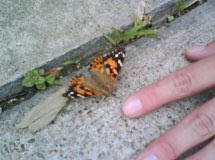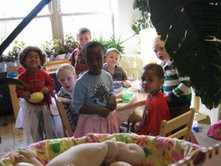Subject: The Puppy
Puppy Size
“Danielle keeps repeating it over and over again. We’ve been back to this animal shelter at least five times. It has been weeks now since we started all of this,” the mother told the volunteer.
“What is it she keeps asking for?” the volunteer asked.
“Puppy size!” replied the mother.
“Well, we have plenty of puppies, if that’s what she’s looking for.”
“I know…we have seen most of them,” the mom said in frustration…
Just then Danielle came walking into the office
“Well, did you find one?” asked her mom. “No, not this time,” Danielle said with sadness in her voice. “Can we come back on the weekend?”
The two women looked at each other, shook their heads and laughed.
“You never know when we will get more dogs. Unfortunately, there’s always a supply,” the volunteer said.
Danielle took her mother by the hand and headed to the door. “Don’t worry, I’ll find one this weekend,” she said.
Over the next few days both mom and dad had long conversations with her.
They both felt she was being too particular. “It’s this weekend or we’re not looking anymore,” Dad finally said in frustration.
“We don’t want to hear anything more about puppy size either,” Mom added.
Sure enough, they were the first ones in the shelter on Saturday morning. By now Danielle knew her way around, so she ran right for the section that housed the smaller dogs.
Tired of the routine, mom sat in the small waiting room at the end of the first row of cages. There was an observation window so you could see the animals during times when visitors weren’t permitted.
Danielle walked slowly from cage to cage, kneeling periodically to take a closer look. One by one the dogs were brought out and she held each one.
One by one she said, “Sorry, you’re not the one.”
It was the last cage on this last day in search of the perfect pup.
The volunteer opened the cage door and the child carefully picked up the dog and held it closely. This time she took a little longer.
“Mom, that’s it! I found the right puppy! He’s the one! I know it!” she screamed with joy. “It’s the puppy size!”
“But it’s the same size as all the other puppies you held over the last few weeks,” Mom said.
“No not size… the sighs. When I held him in my arms, he sighed,” she said. “Don’t you remember? When I asked you one day what love is, you told me love depends on the sighs of your heart. The more you love, the bigger the sigh!”
The two women looked at each other for a moment. Mom didn’t know whether to laugh or cry. As she stooped down to hug the child, she did a little of both.
“Mom, every time you hold me, I sigh. When you and Daddy come home from work and hug each other, you both sigh. I knew I would find the right puppy if it sighed when I held it in my arms,” she said.
Then holding the puppy up close to her face she said, “Mom, he loves me. I heard the sighs of his heart!”
Close your eyes for a moment and think about the love that makes you sigh. I not only find it in the arms of my loved ones, but in the caress of a sunset, the kiss of the moonlight and the gentle brush of cool air on a hot day.
They are the sighs of God. Take the time to stop and listen; you will be surprised at what you hear. “Life is not measured by the breaths we take, but by the moments that take our breath! away.”




